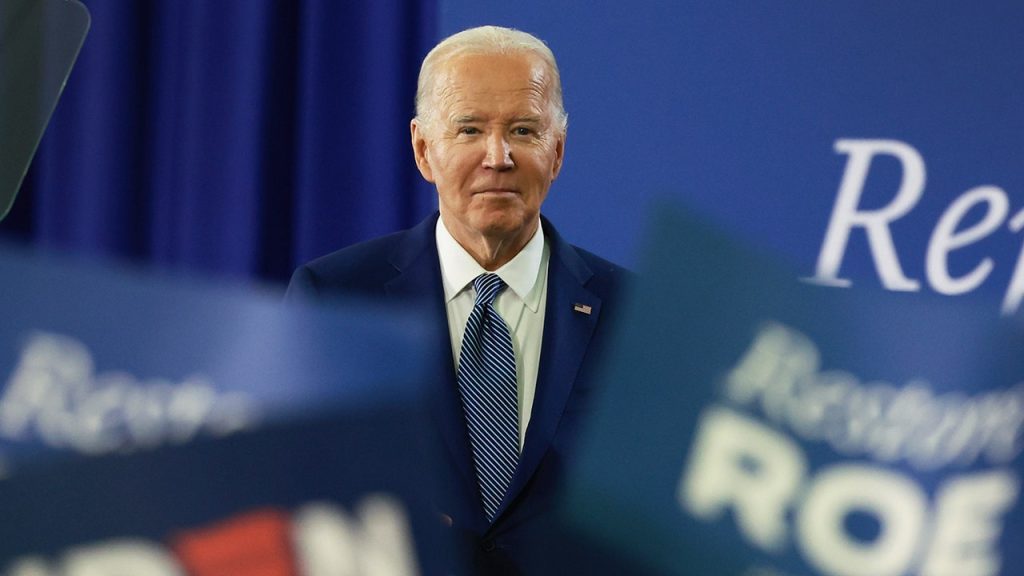President Biden’s re-election campaign clarified that the president does not support “full-term abortions”, in response to remarks made by independent presidential candidate Robert F. Kennedy Jr. The campaign emphasized Biden’s support for Roe v. Wade while distancing themselves from Kennedy’s stance on the issue. A Democratic National Committee spokesperson criticized Kennedy for not standing up for reproductive rights, claiming he would sign a national abortion ban and dismisses the importance of abortion rights. With the Supreme Court’s recent decision to overturn Roe v. Wade, abortion has become a key issue on the campaign trail, with Democrats highlighting the threat to reproductive freedom posed by Republican-led states passing restrictive legislation.
During a speech in Tampa, Florida, Biden accused former President Trump of taking away women’s rights and pledged to restore those rights if re-elected. The issue of abortion has been a focal point in Democratic campaigns, with President Biden condemning the actions of his predecessor on the issue. Meanwhile, several Republican states have implemented restrictive abortion laws, prompting a push from Democrats to protect and expand abortion rights through various ballot initiatives. This stark divide on abortion issues has underscored the importance of reproductive rights in the upcoming election.
In an interview on “The Sage Steele Show,” Kennedy defended his stance on late-term abortions, arguing that it should be left to the woman to decide, rather than the state. He acknowledged the complexity and seriousness of the decision to undergo a late-term abortion, pointing to extenuating circumstances that may influence such a choice. Kennedy’s position on abortion has garnered attention and scrutiny, particularly following his remarks in support of limiting abortions to 15 or 21 weeks. However, his campaign clarified that he does not support legislation banning abortion, despite his previous comments.
The debate over abortion rights remains a contentious issue in the political arena, with President Biden and other Democratic leaders advocating for the protection and expansion of reproductive rights. Kennedy’s position on late-term abortions has sparked controversy and discussions surrounding the role of the state versus individual autonomy in reproductive healthcare decisions. As the election approaches, candidates’ stances on abortion and related issues are likely to continue shaping the public discourse and influencing voters’ decisions at the polls. The clash between pro-choice and pro-life advocates underscores the ongoing battle for women’s rights and access to comprehensive healthcare services.
President Biden’s commitment to upholding Roe v. Wade and defending reproductive rights contrasts with Kennedy’s more nuanced stance on abortion, particularly regarding late-term procedures. While both emphasize the importance of trusting women to make their own healthcare choices, the specifics of how abortion should be regulated and governed diverge between the two candidates. The intersection of personal beliefs, government intervention, and medical ethics in the realm of abortion policy underscores the complexity of this issue and the challenges faced by policymakers in addressing it effectively. As the presidential campaign unfolds, the debate over abortion rights is expected to remain a key battleground for competing visions of healthcare and individual freedom.
Overall, the issue of abortion continues to be a divisive and polarizing topic in American politics, with candidates and voters alike grappling with complex ethical, legal, and moral considerations. President Biden’s campaign’s refutation of full-term abortions reflects a broader effort to position him as a defender of reproductive rights in the face of challenges posed by opponents of abortion access. Conversely, Kennedy’s nuanced stance on late-term abortions highlights the need for a balance between individual choice and societal interests in regulating reproductive healthcare. As the election season progresses, the debate over abortion is likely to remain a central focus, illuminating the deep ideological divides and policy implications at stake in shaping the future of women’s health and autonomy.













